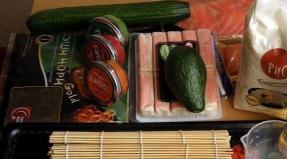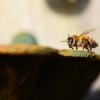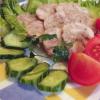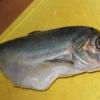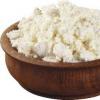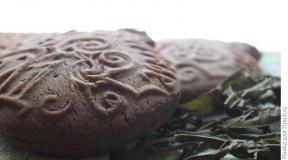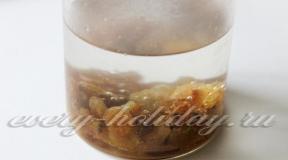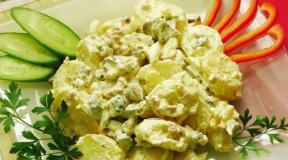Cod stinks. Housewife secrets: how to cook odorless cod
Many people refrain from buying and cooking cod. Its specific smell is to blame. However, in vain, because if you know how to cook cod correctly, you can get rid of the unpleasant aroma and get a tasty and healthy dish.
Cod is very healthy and nutritious. It can become part of the dietary table, since it contains a lot of protein, useful trace elements and other valuable substances that are extremely necessary for the human body.

To reduce the amount of salt in your fish, cut it into plates and soak it in clean, cold water before cooking.
You can also get rid of the cod odor by soaking, but not in water, but in milk. Another way to eliminate the specific flavor is to marinate the fish. Wine sauce is perfect for this, it will not only eliminate the smell, but also add an indescribable, delicate and refined taste to the cod.
The best way to cook cod is by steaming or stewing in the oven.

You will need half a kilogram of cod fillets. Cut the fish into slices, rub with salt, lightly pepper and sprinkle with fresh lemon juice. Let the fish steep a little. Then place the fish in a layer on a baking sheet for further baking in the oven. Place onion rings on top and sprinkle with chopped divisions. Preheat the oven to 180 degrees and place a baking sheet with fish in it. Bake for about 20 minutes, then remove the baking sheet and pour white wine on top of the cod, one glass is enough, and return to the oven again, but this time for 5-7 minutes.
Such fish, gutted, can be poured with a vinegar solution with 3 bay leaves for 3 hours or with chopped onions. Another option is to rub the fish with lemon.
To prevent the fish from smelling like mud, it is washed in a very strong cold salt solution (many cooks recommend adding a little more soda) or rubbed with black pepper and dill, washed and cooked after 20 minutes using dill.
Fresh fish will not give off a "swamp" if you put two or three red-hot birch coals in the water with the fish. This applies, for example, to fish such as pike.
You can also get rid of the smell of mud like this:
Peel the fish,
Rinse,
Cut into pieces,
Place in a dish, best enamel,
Sprinkle with finely chopped bay leaves,
Cover with warm water
Leave covered for just 1 hour.
Drain the water before boiling or roasting, do not rinse the fish.
There are several ways you can get rid of the unpleasant odor in sea fish.
1. Take a sea fish and remove scales from it. Moisten a cloth napkin or just a piece of cloth with vinegar and wrap the fish in it. The fish should be in this state for 2-3 hours. Moreover, you need to defrost it not quickly, but gradually.
2. Boil such fish in a saucepan with bay leaves and allspice peas. In addition, you can wrap a rag dipped in vinegar around the lid of the pot from the inside.
How to eliminate the specific smell of fish such as
Flounder,
In addition to roots, onions and spices, 0.5 cups of cucumber pickle are added to them for each liter of water.
Many fish species have a strong, specific odor. Among the peoples of the North, it is customary to get rid of this smell when cooking or stewing fish by adding a little milk to the pan. Then the smell will disappear, and the fish will taste more pleasant and much softer.
All people smell differently, but fishy aromas annoy most of us. Therefore, any housewife needs to know how to get rid of the smell of fish in an apartment, what measures should be taken to reduce the intensity of the smell when storing or preparing fish, as well as removing it from the refrigerator, dishes and soaked towels, curtains. After all, it is completely inappropriate to refuse such a valuable product, which is necessary for the full filling of the diet, because of the not very pleasant smell.
Many of us love fish dishes. Moreover, many people like fish in various forms - fried, smoked, boiled, and some even eat raw. This element of our food is extremely useful, it contains a lot of vitamins and specific fatty acids useful for the body.
Alas, this product also has a somewhat unpleasant feature - a rather persistent odor, which can be very difficult to get rid of. And if the cooking process is long enough, then nothing helps, not only curtains or tablecloths begin to exude an aroma, sometimes even wallpaper is impregnated with a smell.
Any fish has a very specific smell, some varieties smell more pronounced, others not very strong, but it is almost impossible to find a product without this feature.

Any fish has a very specific smell.
The smell of this product will always be present. Sometimes less, sometimes more pronounced, but our sense of smell will always feel it. Interestingly, most of us recognize these scents as a real stench.
If you are going to pamper your family with fish dishes, the hostess should know that “aromatic” problems will accompany the process at all stages - from cooking to consuming the finished dish. The main problems are as follows:
- a specific, sometimes quite unpleasant smell remains on all utensils used for cooking - knives, cutting board, bowls, frying pan;
- it is impossible to store a poorly packaged product in the refrigerator, other products and walls are instantly saturated with a smell that does not disappear even during the cooking process;
- kitchen towels that have been in contact with even a small carp are extremely difficult to wash, and the smell can be removed only when very strong products are used;
- some ready-made dishes sometimes have a rather strong "aroma" that not everyone likes. For example, there is often a pronounced taste in the ear, which is very problematic to remove.
In addition, the process of frying fish is usually accompanied by a strong odor, which, with certain types of food, can be very unpleasant and rich. Even the most powerful and modern hood is not able to cope with this. The air in the kitchen becomes unpleasant, the whole room and objects in it are saturated, and not only the kitchen room, the rest of the rooms are also exposed to this "aroma".
Therefore, at all stages of working with fish products, certain measures will have to be taken. A number of the simplest and most common remedies will help in this: vinegar, ordinary salt, lemon or orange peel. And, of course, you need to start with storage. The product should be packaged as tightly as possible.
Advice! It is best to store fish in the refrigerator in tightly sealed containers or carefully wrapped in plastic wrap.
The best helper is salt
Surprisingly, but the best assistant in the fight against fish (and not only) odors is ordinary salt, which is able to adsorb a variety of aromas. It's also a good idea to have vinegar, lemon, or other citrus fruits in your kitchen.
The best helper in the fight against fish (and not only) odors is common salt
First of all, in a smelling room (usually a kitchen), it is recommended to heat a small amount of salt in a frying pan; after a very short time, you will notice a significant decrease in the unpleasant "aroma". After that, you can use the zest of any citrus fruits, which must also be heated in a small frying pan, or simply hold a little over the burner fire.
In addition, the fishy "aromas" of vinegar or lemon juice are well removed, which must be diluted with water and boiled for about five minutes. After that, the kitchen will have to be thoroughly ventilated.
We remove fish tracks from dishes, cutting boards, towels and other things
For the preparation and cutting of raw fish, it is best to select a separate board, while it is recommended to choose it from a material other than wood. Wooden boards (as well as old and not very high quality ones) have the ability to absorb the liquid released during the cutting process, and it will be almost impossible to completely remove this liquid later.
This is a pretty good piece of advice, and if you follow it, you will probably be able to keep the rest of the food from fishy aromas.
Another remedy to combat this scourge is mustard.
The vinegar and salt already mentioned above will help in eliminating odors from kitchen utensils. In the kitchen, it is imperative that paper towels are available, with which you must thoroughly wipe the pan used to prepare the dish, after which it can be washed. Fill the washed and dried frying pan with a small amount of salt, put it on the stove, heat it for about 5 minutes, - the aroma is gone.
Another remedy to combat this scourge is mustard, familiar to all of us, which is present, probably, in any kitchen. Mustard (powder or ready-made seasoning) must be dissolved in warm water. The resulting solution is used to process the dishes, and if necessary, the refrigerator inside. By the way, this method is one of the most common in the fight against fish "flavors".
- Surfaces (not only dishes) are wiped with an onion or potato cut into halves.
- The problem is eliminated by wiping with a cloth soaked in sunflower oil. After that, the dishes must be washed out with any detergent.
- The fishy spirit is perfectly interrupted by a much sharper beer. Therefore, the utensils can be treated with beer, which is then very easy to rinse off.
- To wash towels, aprons or other clothes soiled with fish, things are soaked in warm water with the addition of vinegar. In this case, 2 tbsp is used. l. vinegar in 5 liters of water. After a couple of hours, the items must be thoroughly rinsed and washed as usual.
As you can see, experienced housewives do not get lost and know that the smell of fish in the apartment can be easily defeated.
Important! The main thing is to stock up in advance with the ingredients necessary for cleaning (vinegar, beer, salt or others) before any preparation of fish dishes and wash the dishes without putting it off until tomorrow. The same goes for washing stinky towels, aprons, or other clothing.
Dear Andrey! You are right, the smell of ammonia is one of the signs of spoilage for fish and non-fish species.
It is caused by the activity of the spoiling microbes. As a result of the action of proteolytic enzymes of microbes on fish proteins, ammonia, trimethylamines, hydrogen sulfide, indole and a number of other unpleasant smelling substances are formed.
There is even such an indicator of the quality of fish - the determination of nitrogen in volatile bases, which includes ammonia. Most likely, judging by your descriptions, this is the reason for the smell, and you should not think about the presence of some kind of chemical contamination of the fish. In some squid species, the presence of a faint smell of ammonia does not indicate spoilage.
It is hardly possible to speak of a great danger to the health of such products, but, of course, there is a risk, like any other not too fresh product. The safest, as a rule, are fish products produced by ship enterprises and enterprises located in the coastal zone.
If a fish processing enterprise is located at a considerable distance from the regions where fish are caught, then problems with the quality of raw materials at the time of their delivery to the plant are quite common.
Roskontrol intends in the future to pay great attention to the problem of the quality of products from fish and non-fish objects of the fishing industry and to do everything possible so that the products of unscrupulous manufacturers do not end up on the shelves.
Before processing fish, place it in a bowl of water, if the fish sinks - it is fresh, if not, then refuse to cook this product.
Frozen fish is thawed in cold water with the addition of 1/2 tbsp. tablespoons of salt per 1 liter of water.
Fish fillets are thawed without water to avoid losing nutrients and impairing the taste of the fish.
To eliminate the pungent, specific odor of flounder, remove the skin from the dark side when cleaning it.
Food waste left over from fish preparation for frying (head, bones, fins, tails) should be used to boil a small amount of broth, in which you can make a delicious sauce.
Do not allow the liquid in which the fish is boiled to boil too much.
Fish broth is salted at the very beginning of cooking.
Fish cakes will taste better if you put finely chopped and lightly fried onions in the minced meat.
Before frying, the fish should be salted as follows: dilute one teaspoon of salt in a glass of cold water and pour the prepared fish with the resulting brine, drain the brine after 5-7 minutes.
In order for the fish to brown well, it is recommended to dry it with a paper towel before frying.
So that the fish is well browned during frying and does not burn, pork fat or butter is added to the vegetable oil.
Fried fish turns out to be delicious if you hold it in milk before frying it, then roll it in flour and fry in boiling vegetable oil.
Cover the pan with an overturned colander to keep the fat from splashing and the fish to be fried better.
Regardless of the size, the fish is baked or fried in a highly heated oven.
When frying, the fish will not fall apart if it is salted 10-15 minutes before cooking.
Boiled fish is done if the fins come off easily.
Fried fish is ready if clear juice flows out when pressed with a spoon.
After fish and fatty meals, you should not drink cold water.
Do not store fish next to dairy products, as this can give them a fishy smell.
If the dishes retained the smell of fish or onions, they should be rinsed with water and vinegar, then the smell will disappear.
Herring will be tender and soft if soaked in milk.
Fresh fish can be stored for two to three days in a well-ventilated area in summer, if it is previously gutted, gills removed, but not washed, but wiped with a rag, rubbed inside and out with salt with a small addition of black ground pepper.
There is also a way to preserve (up to two days) fresh fish without a refrigerator. Cut it open and sprinkle with coarse salt on the outside and inside, and then wrap it in a clean cloth soaked in slightly sweetened vinegar (1-2 lumps of sugar per 1/2 liter of vinegar).
Raw fish should not be stored near products that are used without heat treatment (sausages, cheeses, etc.).
Immediately after opening, transfer all canned fish to porcelain or glass dishes. Even in the refrigerator, they cannot be stored in an open tin.
To eliminate the strong smell of fish frying, place one potato, peeled and cut into slices, in vegetable oil.
The fish broth will be transparent if you strain it through 2-3 layers of gauze or a napkin dipped in hot water. You can lighten the broth with whipped egg white.
When cooking, the fish should be immersed in cold water.
It is better to cook small fish whole, after gutting it.
To get a good rich fish broth, you can use the spine and head remaining after the section of the large fish (removing the gills and eyes).
When cooking flounder, cod, halibut, to eliminate the specific smell of fish in the dish, you can add parsley or celery root, onions, spices and pour in cucumber pickle (1/3 cup per 1 liter of water).
Fish cooked in water with the addition of milk will taste softer.
Frozen fish should be thawed in cold salted soda (1 teaspoon per liter) to reduce minerals consumption. It is better to thaw fish fillets in the air.
Fish should be baked in a highly heated oven.
To make it easier to clean the fish, you can do it in a plastic bag.
The specific smell of fish can be easily eliminated by sprinkling it with diluted vinegar or lemon juice.
Fish with a strong smell should be boiled in water with a lot of roots and spices, or add a cucumber solution (0.5 cups per 1 liter of water).
So that the fish does not fall apart during cooking, it must be cooked in small pieces in a shallow dish, and wait until the salt is completely absorbed before frying - this will take 10-15 minutes.
The fish cannot be cooked at a strong boil, but it tastes better when steamed.
If bile accidentally spills while cutting fish, you need to rub the places where it got in with salt and rinse the fish with cold water.
To avoid an unpleasant odor when frying fish in the kitchen, place pieces of raw potato in the pan.
Salted fish, before cutting, is poured with cold water so that it swells slightly - then it will be easier to clean.
To prevent the fish from falling apart when frying, it must be cut and salted 15 minutes before cooking.
Strongly salted fish is soaked in cold water for 4-6 hours. The water is changed every 1-2 hours. It is not recommended to store soaked fish.
Live fish are first silenced with a blow to the head, then an incision is made between the pectoral fins and the blood is allowed to drain. Only then they begin to clean the fish.
The insides of fish (not large) can be removed without cutting the abdomen. To do this, you need to make a deep incision near the gills, cut the spine and remove the head along with the entrails. Rinse the carcass thoroughly.
When frying the fish, add a little salt to the hot oil to make the fish crisp.
If you boil fish with cucumber pickle, it will not boil and crumble.
So that fresh fish does not smell like mud, after cutting it must be put into water with the addition of sodium chloride and soda.
In order for the fish to be well cleaned of the scales, it must be dipped in boiling water, and then put into warm water with the addition of vinegar.
The skin of the fish is easily removed if you first spray it with vinegar.
If the herring is too salty, soak it in tea or milk.
When baking, it is better to cover the fish with foil so that it retains its juiciness.
In order for the fish to brown well, it is necessary to dry it with a towel before frying.
Scales are easier to remove if you start brushing the fish from the dorsal fin to the abdomen and tail.
Saltwater fish will be more tender if sprinkled with sugar 30-40 minutes before frying.
The fish can be boiled with the head; it is enough to remove the eyes and gills. But fish is usually fried without a head.
Pre-softened butter can be added to the minced fish.
If the mass of frozen fillets has insufficient viscosity, an egg should be added to the mass.
To keep the squid soft after cooking, they must not be overcooked. Cook them for no more than 5 minutes.
Fish, small and cut into pieces, is placed in boiling water so that it is not overcooked.
When boiling frozen fish, you can only put it in cold water.
When cooking, large fish are placed in cold water, and when it boils, water is added as needed.
The liquid in which the fish is boiled should not be allowed to boil.
COD(Atlantic, Pacific, Baltic, White Sea, Greenlandic), marine schooling bottom fish. Length from 40 cm to 1.8 m, weight from 5 to 40 kg. Inhabits the waters of the Atlantic, Pacific and Arctic oceans. The largest cod lives in the Barents Sea, somewhat smaller in the Baltic, even less in the White Sea. An important fishing object. It goes on sale mainly chilled or frozen in the form of a headless carcass or fillet, as well as canned food (in tomato sauce, in oil) or salted. Delicious table fish. The meat is white, dense, juicy, without small bones, with a characteristic smell of sea grasses, contains protein, little fat, rich in potassium, calcium, magnesium, phosphorus, iron. Cod liver is valuable because it contains vitamins D, group B, carotene, more than 60% fat. Cod liver canned food is an excellent dietary and snack food. In cooking, cod is usually used to prepare first and second courses, boiled, fried (a national dish of Norwegians and Icelanders), stewed with vegetables. Cutlets, zrazy, meatballs, and pie filling are prepared from cod. Before cooking, it is recommended to hold the prepared cod in water with vinegar for several minutes to destroy the sea smell and make the fish juicier.
Herring oceanic (Atlantic, North Sea, Pacific) - marine schooling fish. Length 35–45 cm, less often - up to 75 cm, weight 200–500 g. The main nutritional value of herring is complete proteins, which include a number of essential amino acids. Herring is also rich in vitamins A, D and oleic acid, potassium, calcium, cobalt, phosphorus, iron, manganese, copper. Herring surpasses beef in iodine content. 100 g of herring gives about 150-200 kcal and contains 15-18 g of protein, 6-20 g of fat.
In home cooking, it is used mainly ready-made - salted and smoked. Less commonly, dishes are prepared from fresh herring. Salting herring began in Holland in the XIV century. In honor of the inventor of the herring salting (Beckel), the Dutch herring is called “beckling”. It tastes significantly different from Scottish, Norwegian, Icelandic herring. In Novgorod, Dutch herring has been known since the 15th century. Already in the 17th century, herring became an indispensable part of the Russian folk table. The Azov and Caspian herring was salted somewhat differently than the Dutch one. Large Caspian herring, smoked, is called a hall. Usually served with a dressing of sunflower oil, vinegar, and onions. In addition to the once famous zoloma and ivashi, in Russia, the following became very popular: - Atlantic herring, containing about 17.7% protein, 19.5% fat, calcium, phosphorus, iodine, vitamins A. D, B1, B2;
- North Sea herring containing protein - 16-19%, fat - 12-26%;
- Pacific herring, containing 15-19% protein, fat - from 2% to 33%.
For those who suffer from kidney disease, liver disease, gastritis with high acidity, atherosclerosis, hypertension, fresh herring is recommended in boiled form, and salted herring must be soaked. If a person suffers from a disease of the heart and blood vessels, accompanied by edema, as well as peptic ulcer, enterocolitis, then salted herring in his diet is sharply limited, but not excluded.
SALMON(salmonids), a family of fish of the order salmoniformes.
Length from 50 cm to 1.5 m. 8 genera, in the basin of the Arctic Ocean, in the northern part of the Atlantic and Pacific oceans, the Black, Caspian and Aral (in the past) seas. Many valuable commercial fish belong to salmon - pink salmon, chum salmon, chinook salmon, coho salmon, sockeye salmon, kundzha, salmon (salmon proper), taimen, char, etc. Valuable red caviar is also obtained from salmon. Both fresh and frozen salmon and canned salmon are on sale. Salmon balyk and various smoked and salted products are also very popular. In modern Russia, salmon are often incorrectly called red fish, having already forgotten the original meaning of this concept. Red salmon is also called red salmon. Sockeye, coho and sima, Pacific salmon, surpass other species in fat content and have the most delicious bright red meat. Trout lives in the basins of the northern seas of Russia and the Baltic Sea. Another species of brown trout lives in the Caspian Sea and the rivers of its basin. Weight up to 5 kg. Pacific kundzha and Dolly Varden char are relatively small (from 400 g to 2 kg). The quality of the meat is inferior to the meat of other salmonids. Alpine char lives in cold mountain and northern water bodies, and its anadromous varieties reach 15 kg, while the living ones are much smaller (up to 0.5 kg). Alpine char meat is fatty and tasty, but rarely on sale. Soup is often made from fresh salmon. It is better to fry them breaded or in batter, it is also good to bake them.
STURGEON, anadromous and freshwater fish.
They live in the rivers of the Caspian, Azov, Black Seas, in the rivers and lakes of Siberia. There are 13 species, including: sturgeon, sterlet, stellate sturgeon, beluga, kaluga. Length up to 9 m, weight - up to 1.5 tons. Sturgeons have an elongated body covered with 5 rows (dorsal, lateral and abdominal) knuckles of the plates (bugs). The head is also covered with bony scutes, the snout is elongated, there are 4 antennae near the mouth. All sturgeons spawn only in plain water. Among sturgeons, their white, dense meat without bones, up to 30% fat, is highly valued, from which, as a rule, hot smoked products and balyk products are prepared. Also, black caviar of the highest quality is obtained from sturgeon.



